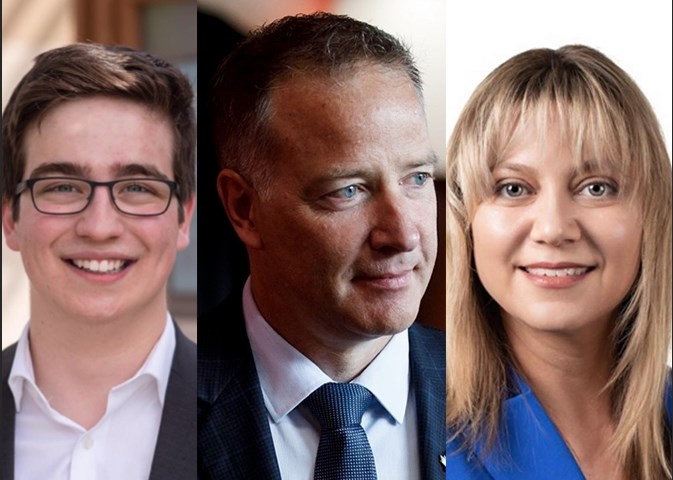
NDP candidate Justin Kulik, Liberal MP Stephen Fuhr and Conservative Tracy Gray are candidates in the 2019 election.
Image Credit: FILE PHOTO
September 13, 2019 - 11:00 AM
You'll find all of our election coverage for the Kelowna Lake Country riding in one post — this one. There will be stories, plenty of them. But we want you to have one space to come for background information and changes as they roll out. We also want you to tell us when you have questions you want answered. Leave them on this post and we will offer them to our candidates as the campaign rolls out.
FOR CANDIDATES, GO HERE
THE RACE IS ON
As far as the Okanagan goes, Kelowna Lake Country may be the most interesting race to watch. It's a spot of red in an otherwise sea of blue and whether current MP Stephen Fuhr can keep it that way is the question people are asking.
Advance polls show that the race between Liberals and Conservatives is very close nationally, and that will make a big difference in the local race, Maxime Heroux-Legault, an assistant professor of economics, philosophy and political science with UBC’s Okanagan campus said.
“Last time around the Liberals had a significant lead and that’s how they got Kelowna as a riding and now that the scores are more even there’s a chance for them to get it back,” Heroux-Legault said. “This assuming the polls don’t move between now and Election Day, which is a strong assumption.”
READ MORE: Election 2019: Voters Toolkit
READ MORE: Kelowna Lake Country advanced polls well attended
READ MORE: Kelowna Lake Country appears to be leaning blue
READ MORE: How concerned are you with climate change
READ MORE: Okanagan Greens express controversial abortion views
READ MORE: Jean Chretien endorses Kelowna MP on riding visit
What may dictate the local outcome may not have anything to do with local issues or the men and women who are vying to represent the region.
Research, he said, indicates that local candidates aren’t really the focus when people cast a ballot in the federal election.
“They’re a minor part of the voting decision,” he said. “There are local considerations, like province — people from B.C. vote differently than people from Alberta who vote differently than people from Ontario. But leader evaluations are the most important.”
Voters will decide whether they think the Prime Minister is honest and competent and whether policies align with their values and that will influence their decision.
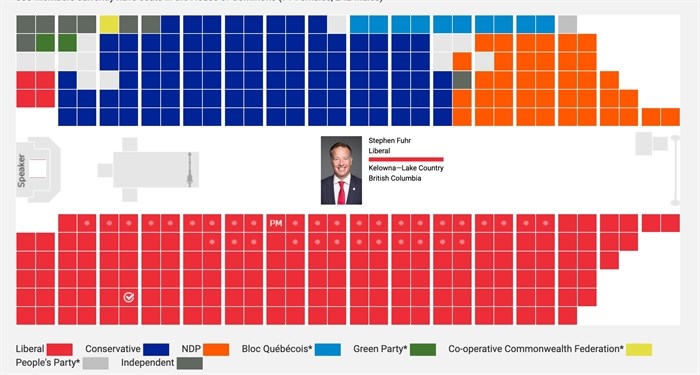
In 2015 the Liberals won a majority government with 184 of the 338 seats in the expanded Commons. The Liberals picked up 148 seats, the biggest numerical increase for a Canadian party since Confederation.
Image Credit: SUBMITTED/HOC
IT'S NOT EASY BEING... SOMETHING OTHER THAN BLUE
A search of Elections Canada’s historical data shows that over the last 60-plus years there have been two political shifts away from conservative politics in the Central Okanagan.
The first was in 1968 when Kelowna, like the rest of the country, was swept up in a wave of what was then called Trudeaumania and voted in Liberal MP Bruce Howard. Howard was one of the 155 Liberals elected to the House of Commons that year.
The Conservatives took only 72 seats, the Kelowna Courier reported at the time, and Howard said it was because Trudeau-senior “inspired people to think there was something worthwhile about politics.”
The second was in October 2015 when Liberal Stephen Fuhr turned 45 years of history on its head, toppled Conservative incumbent MP Ron Cannan and became the MP of Kelowna Lake Country. It was part of a Canadawide return to power for the Liberals that rebounded from third place in the House of Commons with 36 seats to a strong majority government with 184 of the 338 seats in the expanded Commons.
Otherwise, this region’s residents have mostly been a shade of blue when voting, depending on the year voting in Social Credit, Reform or Canadian Alliance MPs.
When the Progressive Conservatives merged with the Canadian Alliance, the Okanagan Valley officially became Conservative.
How this valley was settled is part of the reason.
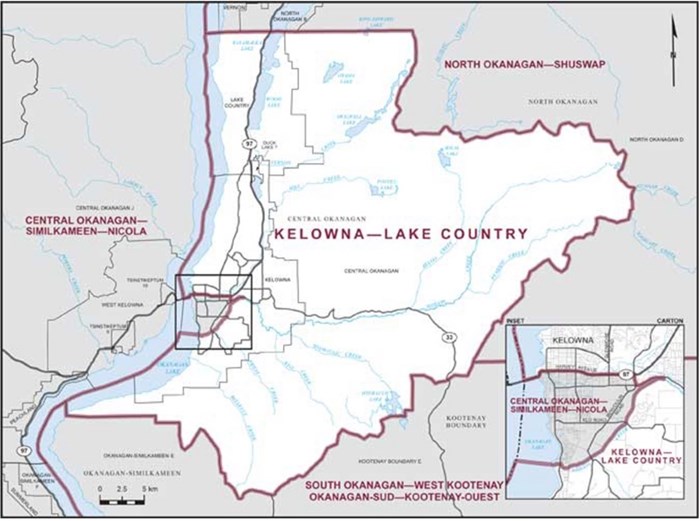
Kelowna Lake Country's boundary Consists of those parts of the Regional District of Central Okanagan comprised of:
(a) Subdivision Central Okanagan;
(b) the District Municipality of Lake Country;
(c) Duck Lake Indian Reserve No. 7; and
(d) the City of Kelowna, excepting that part described as follows: commencing at a point in Okanagan Lake located at the intersection of the westerly limit of said city with Highway No. 97; thence generally easterly along said highway and Harvey Avenue to Dilworth Drive; thence southerly along said drive to Springfield Road; thence generally easterly along said road to Ziprick Road; thence southerly along the southerly production of said road to the northerly bank of Mission Creek; thence generally southwesterly along said bank to the easterly shoreline of Okanagan Lake; thence due west across said lake to the westerly limit of said city; thence northerly along said limit to the point of commencement.
Image Credit: ELECTIONS CANADA
WHO ARE YOU?
The make up of this city has changed over time, but its history and the way it was settled has effected the way people vote. The first wave of settlers to the valley was from conservative strongholds like Great Britain, Germany and Holland.
Hamish Telford a political science professor from the University of the Fraser Valley said these people were conservative in terms of their values and they gave way to politically right-wing powerhouses like W.A.C. and Bill Bennett in provincial politics of the past.
W.A.C., a hardware merchant from Kelowna, was elected B.C.’s premier in 1952 and held the role for 20 years, earning votes by paving roads and building bridges.
Bill became premier in 1979 and implemented the “restraint” program which was aimed at unburdening businesses from government spending on social services.
Their free-market economy approach to politics was a departure from what was happening in eastern provinces and set this region on its political path.
“That history has its legacy with how people are politically socialized,” Telford said. “The Okanagan also has a lot of retirees and older people are more conservative than younger people.”
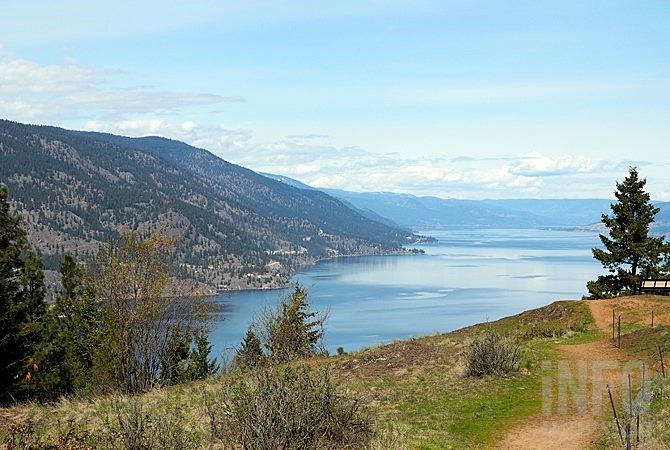
Looking out over Okanagan Lake from the top of Knox Mountain.
(ADAM PROSKIW / iNFOnews.ca)
CHANGES
As they say, there’s nothing as consistent as change.
While the valley isn't known for its multiculturalism there are changes afoot with a growing ethnic diversity being shown in the 2016 Census. Around six per cent of the population belongs to a visible minority, with South Asians accounting for the largest proportion of that number. About 3.4 per cent of the population is Aboriginal.
There is an increasing number of young people. The Central Okanagan Economic Development Commission tracks demographic changes and has shown from 2006 to 2016 the Central Okanagan had population increases in most age categories, with youth and young adult population growth surpassing the provincial and national average.
“While the region remains popular with retirees, it is interesting to note above-average growth in the 25 to 34 years as young professionals and families are drawn to the region’s career opportunities and relative lifestyle affordability,” reads the commission’s 2018 report.
WHAT TO WATCH FOR
Maxime Heroux-Legault, an assistant professor of economics, philosophy and political science with UBC’s Okanagan campus said there are a few issues locally that are capturing attention.
One of which is First Nations and reconciliation.
“That’s something important in the region,” Heroux-Legault said.
“Also anything related to pipelines and the environment — that’s more B.C. than local, but a commitment to protecting the landscape is important.”
Recent city studies indicate that crime is top of mind for local residents as well, though it's out of the purview of federal politics in many ways.
KELOWNA - LAKE COUNTRY - STORIES FROM THE RIDING
CANDIDATES
LIBERAL MP STEPHEN FUHR OPTIMISTIC
Fuhr was elected in 2015, the first Liberal to win the riding in 45 years. He's also a former CF-18 fighter pilot with the Canadian Air Force, who has run a military pilot training establishment and managed a technology company.
After serving with distinction for 20 years, Stephen retired from the Canadian Forces in 2009 with the rank of Major and joined a Kelowna based technology company that develops aviation communication and tracking equipment.
In 2012, he left the company to pursue his first love of flying. With growing interest in politics and the desire to serve his country again, Stephen decided to run for office in the 2015 election. As MP he is Chair of the Standing Committee on National Defence.
HOMEPAGE • TWITTER
CONSERVATIVE CANDIDATE TRACY GRAY ON FINAL DAYS OF CAMPAIGN
Gray left her seat on Kelowna city council and to no one's surprise ran for the Conservative nomination.
Due to party rules the numbers of votes are not allowed to be released, but Ernie Webber, president of the riding's Conservative Electoral District Association, says membership rates soared this campaign.
"The highest membership i's been in 20 years," Webber told reporters. "But turn out was average. We had two candidates that hustled like crazy."
In her speech, Gray acknowledged the boots-on-the-ground work that Conservative members have been doing for the past seven months knocking door-to-door.
Well known in the community, Gray has built businesses in multiple sectors and volunteered extensively.
HOMEPAGE • TWITTER
NDP CANDIDATE JUSTIN KULIK
He’s 18 years old, running as an NDP candidate in the federal Kelowna-Lake Country riding — a historically Conservative stronghold — and a political neophyte.
All that and Kulik is not fazed, knowing he can make a difference when he puts his mind to it.
As an Okanagan-Mission Secondary student, he launched an online petition to eliminate food waste at the grocery retail store level that has so far attracted 225,000 signatures.
Based on the volume of that response, Kulik was given the opportunity to present his petition to the Prime Minister’s Office health advisor, federal agriculture minister Lawrence MacAulay and other MPs on World Food Day, Oct. 16.
HOMEPAGE • TWITTER
GREEN PARTY CANDIDATE TRAVIS ASHLEY
Travis Ashley has said he’ll focus his campaign on three main issues: fiscal responsibility, social justice and ecological integrity for the Okanagan and the country. Last election the Greens didn't run a candidate in this riding, choosing instead to support Stephen Fuhr. A professional chef and nutrition advocate, he sees how sustainable agriculture, protection of farmers, and a strengthened domestic food market is imperative for his riding and for Canada. Travis’s long term goal is to continue the fight for democracy and speak out for those who do not have a voice.
WEBSITE * FACEBOOK*
PEOPLE'S PARTY CANDIDATE JOHN BARR
The People’s Party of Canada candidate for Kelowna-Lake Country made his debut at a recent forum. Previously Solomon Reyek announced his candidacy. A search for a website or social media presence has come up short, though we'll keep checking.
HOMEPAGE * TWITTER
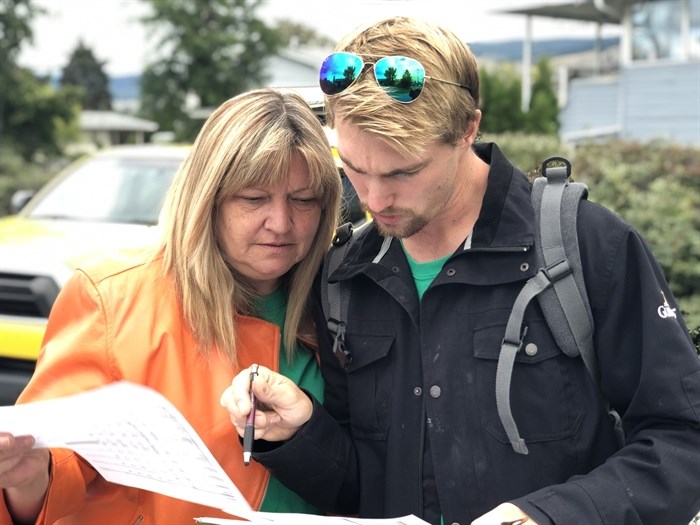
Travis Ashley and Heather Polson are on the green trail.
(KATHY MICHAELS / iNFOnews.ca)
FACEBOOK
To contact a reporter for this story, email Kathy Michaels or call 250-718-0428 or email the editor. You can also submit photos, videos or news tips to the newsroom and be entered to win a monthly prize draw.
We welcome your comments and opinions on our stories but play nice. We won't censor or delete comments unless they contain off-topic statements or links, unnecessary vulgarity, false facts, spam or obviously fake profiles. If you have any concerns about what you see in comments, email the editor in the link above.
News from © iNFOnews, 2019